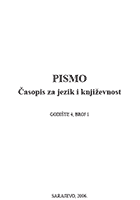Pozdravi u bosanskohercegovačkim dramama 20. vijeka (sociolingvistička analiza)
Greetings in the Bosnian–Herzegovinian dramas of the 20th century
Author(s): Amela ŠehovićSubject(s): Language and Literature Studies
Published by: Bosansko filološko društvo
Keywords: pozdravi; bosanskohercegovačke drame; formalni i neformalni pozdravi; pozdravi pitanja; vjerski i laički pozdravi; ideološki pozdravi; izrazi kojima se želi dobro sagovorniku
Summary/Abstract: Greetings are considered to be the most important symbols of social relations between the participants in a speech act but also of the social circumstances in which it takes place. Since there is a correlation between the structure of the forms of politeness and the society, greetings are very interesting for research in sociolinguistics. In the examined Bosnian–Herzegovinian dramas the next types of greetings can be found: a) formal (Dobro jutro /good morning/, Dobar dan /good afternoon/, Dobra večer /good evening/, Doviđenja /goodbye/ etc.) and informal (Zdravo /hello/, Ćao /hi/), b) interrogative greetings (Kako si/ste? /How are you?/, Šta ima?/What’s up?/), c) religious (Selam alejk) and folkloric (Merhaba), d) ideological (Smrt fašizmu /Death to the Fascism/ , Sloboda narodu /Freedom to people/), e) expressions that express care for the collocutor (Zdravo svano). The verbal conversation is of course followed by the non-verbal expressions– bowing, standing up, bowing of the head, etc., especially in the situations where the status of the participants in the interraction is expressed. The authors of these examined dramas use quite often the potential of these expressions – for example some unexpected combinations of greetings (ideological and formal, religious and folkloric), the lack of greeting, an unexpected answer to the greeting, etc.- in order to point at their social circumstances and to depict better their characters. However, in most cases the religious and the ideological greetings serve as the indicators of changed social circumstances.
Journal: Pismo - Časopis za jezik i književnost
- Issue Year: 2006
- Issue No: 04
- Page Range: 26-42
- Page Count: 17
- Language: Bosnian

